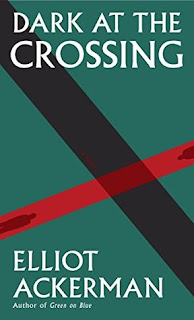Dark at the Crossing
A National Book Award nominee, Dark at the Crossing, by Elliot Ackerman, reminded me a little bit of Ernest Hemingway's For Whom the Bell Tolls. A man, Haris, an Iraqi-born American, has decided he will fight in Syria, against the Hassad regime. His reasons are somewhat nebulous. “He believed in the war but not as a cause. He believed in it as an impulse, the way a painter paints, or a
musician plays, a necessary impulse.” The difference between the two books is that Haris first has to cross into Syria from Turkey, which takes the whole book.
Haris has a history as a translator for the Americans, and a complicated relationship with a soldier named Jim. "He had fought in Iraq for personal gain, at first his citizenship and then money for him and his sister. To sacrifice himself for a free Syria, a cause he knew to be right, was the opposite of all he had done before,
fighting alongside the Americans in a cause he felt to be wrong." We get flashbacks to his experience during the Iraq war, when he disapproves of Jim's use of torture.
As for the present, Haris goes to the border, but it is closed. One must have money and a version of a coyote to get across. Two men seem to help, but rob him, so he goes back and stays with a journalist, Amir, and his Syrian wife, Daphne, who becomes sort of femme fatale, searching for a daughter that may or may not be alive. She ends up deciding to cross with Haris.
Dark at the Crossing is a conventional literary novel--no experimentation or tricks. In some ways it's too conventional, having the mysterious Daphne a sexual object. She and Haris make love, and I think that's a mistake. Even Ackerman seems to think so, as it's never mentioned again. Also, Ackerman, as a white man, is telling a story about Middle-Easterners (some Muslim, some Christian) and there is little about their faith or culture. There is one American in the story, a cliched ugly American who has the absurd idea about making ice hockey popular in Turkey (the book closes with a game).
This book was just fine, not bad, but not great, either. It shone a corner on a part of the world I am unfamiliar with, although any border can be fascinating. Borders, man-made for the most part, are magical lines that exist on maps. Has anyone felt a frisson of weirdness when crossing a border, thinking that after taking a few steps one is in a whole new frame of mind? There's something of that here.
musician plays, a necessary impulse.” The difference between the two books is that Haris first has to cross into Syria from Turkey, which takes the whole book.
Haris has a history as a translator for the Americans, and a complicated relationship with a soldier named Jim. "He had fought in Iraq for personal gain, at first his citizenship and then money for him and his sister. To sacrifice himself for a free Syria, a cause he knew to be right, was the opposite of all he had done before,
fighting alongside the Americans in a cause he felt to be wrong." We get flashbacks to his experience during the Iraq war, when he disapproves of Jim's use of torture.
As for the present, Haris goes to the border, but it is closed. One must have money and a version of a coyote to get across. Two men seem to help, but rob him, so he goes back and stays with a journalist, Amir, and his Syrian wife, Daphne, who becomes sort of femme fatale, searching for a daughter that may or may not be alive. She ends up deciding to cross with Haris.
Dark at the Crossing is a conventional literary novel--no experimentation or tricks. In some ways it's too conventional, having the mysterious Daphne a sexual object. She and Haris make love, and I think that's a mistake. Even Ackerman seems to think so, as it's never mentioned again. Also, Ackerman, as a white man, is telling a story about Middle-Easterners (some Muslim, some Christian) and there is little about their faith or culture. There is one American in the story, a cliched ugly American who has the absurd idea about making ice hockey popular in Turkey (the book closes with a game).
This book was just fine, not bad, but not great, either. It shone a corner on a part of the world I am unfamiliar with, although any border can be fascinating. Borders, man-made for the most part, are magical lines that exist on maps. Has anyone felt a frisson of weirdness when crossing a border, thinking that after taking a few steps one is in a whole new frame of mind? There's something of that here.



Comments
Post a Comment